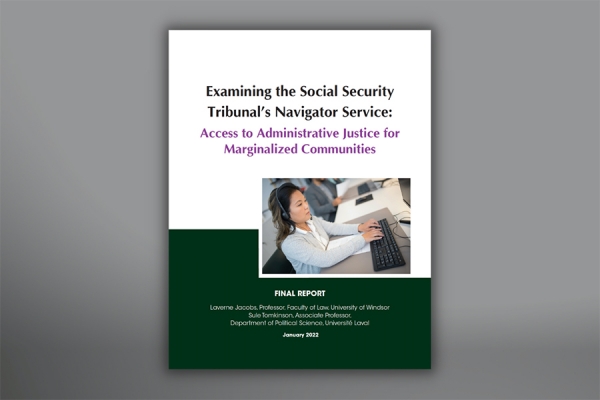 The Social Security Tribunal’s innovative navigator service advances access to justice and also has room for improvement, says a report led by Windsor law professor Laverne Jacobs.
The Social Security Tribunal’s innovative navigator service advances access to justice and also has room for improvement, says a report led by Windsor law professor Laverne Jacobs.
A study led by a Windsor Law professor recommends ways to improve a service that aims to expand access to justice for social security appellants, and suggests the model can be beneficial in other administrative tribunals.
Since 2019, the Social Security Tribunal (SST) has provided a navigator service to make justice more accessible to people who don’t have a lawyer or other professional representation, by guiding them to the start of their hearings.
SST Navigators guide self-represented litigants and those without professional representatives by explaining the role of everyone involved in the appeal, and getting them ready for their hearings.
In 2021, Windsor law professor Laverne Jacobs, director of the Law, Disability & Social Change Project, led an independent study funded by the Department of Justice Canada to examine how the SST Navigator Service has been performing.
The study examines the use of the Navigator Service for Canada Pension Plan–Disability (CPP–Disability) appeals heard by the Income Security - General Division of the Social Security Tribunal between November 2019 and April 2021. The final report, “Examining the Social Security Tribunal's Navigator Service: Access to Justice for Marginalized Communities,” was released this month and provides research findings, analysis, and recommendations.
“Administrative justice needs to be user-centred in order to be accessible,” says Dr. Jacobs. “Attaining this goal requires not only focusing on the law but also on innovative ways to guide, educate, and empower administrative tribunal users.”
Jacobs’ co-investigator on the project is Sule Tomkinson, associate professor in the Department of Political Science at Université Laval.
“For most people, contesting bureaucratic decisions before administrative tribunals is often difficult and confusing,” says Dr. Tomkinson. “The Navigator Service is an innovative response to this danger of complexity and it represents an advancement towards a people-centered approach to administrative justice.”
The researchers conducted 36 semi-structured interviews and document analysis between June and September 2021. Interviews were conducted with 21 former tribunal users (appellants), with 11 navigators, and with four key government officials involved in the design, implementation, and running of the SST Navigator Service. They examined how the SST Navigator Service is performing generally and in relation to marginalized communities.
In their final report, the researchers suggest the SST Navigator Service has several positive aspects and can be used in other tribunals. They also offer a set of key recommendations as a means of continuing and strengthening this valuable access to justice service.
“We were very pleased when professors Jacobs and Tomkinson approached the SST to conduct this study,” says SST chair Paul Aterman. “As neutral observers, they conducted a rigorous review of the Navigator program.”
“They have given the SST practical advice on how to improve the justice services it provides to Canadians. The report also enhances the accountability and transparency of the tribunal’s work, because it is available for anyone to read. These are small, but very important steps in addressing the access to justice crisis that Canadians face today.”
Read the full report on The Law, Disability & Social Change Project website.
—Rachelle Prince
